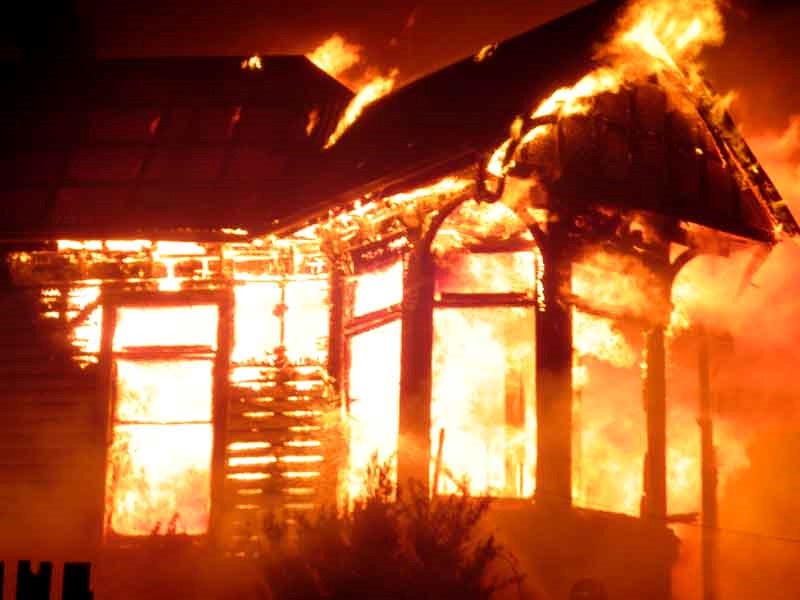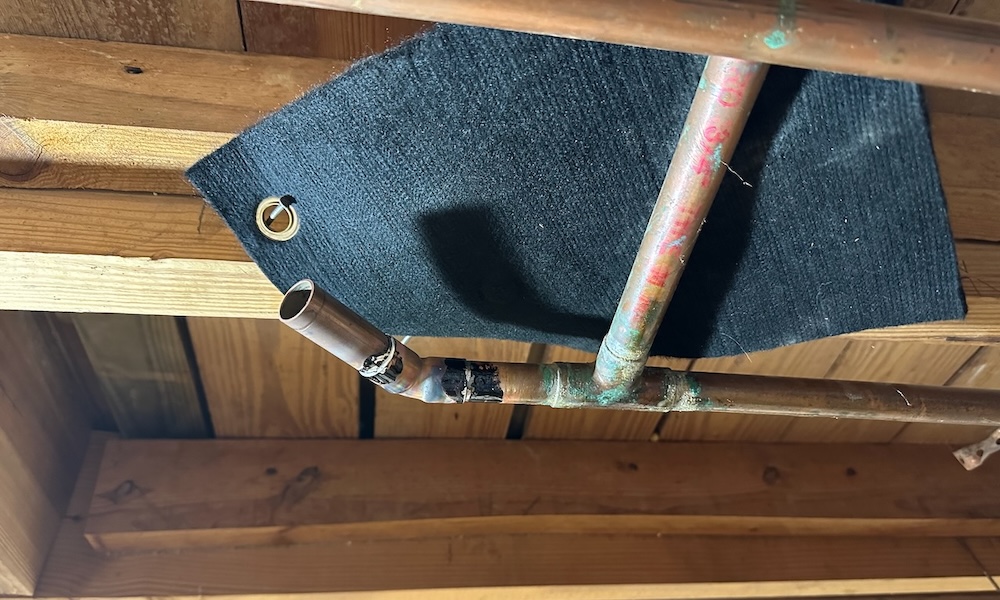
I’ve taken on a whole lot of do-it-yourself (DIY) projects over the years. I built furniture (end table, bookcase, coffee table, etc.) in high school and college. Thanks to owning a couple of old Volkswagens (’61 Beetle and ’65 bus), I’ve done a lot of car repairs and even rebuilt the engines in each of those VWs. My biggest DIY undertaking was building a house in 2001. And now I’m remodeling my basement, doing some of the work myself.
The ugly
Let’s start with the worst parts of do-it-yourself jobs. For example, you may end up doing damage to the thing you’re trying to fix. Heck, you could even flood the basement, blow up the water heater, or burn your house to the ground.
Then again, maybe it’s just you that gets damaged when you fall off the roof or electrocute yourself. Back when I was building a house, I knew of an owner-builder who suffered severe injuries when he fell off a ladder.

Perhaps the problems you create aren’t quite that severe. If the water is off for a few days, you may have an unhappy family but life can continue. Whether it continues with your marriage intact is another matter, though.
And then there’s the possibility that you end up with things going so wrong you have to call in a professional to clean up your mess and fix the original problem plus any new ones you created.
The bad
When you haven’t been trained in the skills needed to do a project, it’s going to be harder and take more time. You won’t always know the right steps. You may not know which tools you need. Sometimes, you’ll create obstacles that a skilled trades person would have avoided.
Take my plumbing project over the past three days as an example. I’ve done plumbing in the past and taught myself to solder a couple of years ago. So I decided I’d move some plumbing lines as part of our basement renovation.

I thought the job would take a day, maybe a day and a half. It took three. And the water to the house was turned off most of that time. By the end of the second day, though, I did get one toilet working in the house.
The delays came from:
- Bad fittings. Not my fault, but it slowed me down.
- Installing the pressure regulating valve backwards. Totally my fault, and I should have examined it carefully to notice the arrow showing the direction of water flow. When installed backwards, it doesn’t let water through.
- Damaging the pressure regulating valve by installing it backwards. After turning it around, I noticed that it had developed a leak. D’oh! That meant another delay.
I ran into a few other obstacles along the way, too, and ended up going to Home Depot 5 times, Ace Hardware twice, and Noland’s plumbing supply once during the three-day project.
The good
I love doing stuff to improve my house! I loved the process of building a house. Planning things out. Making lists. Tearing out the old and putting in the new. It all makes me happy.
Well, I should amend that. It makes me happy when things are going right and when it’s done. As my wife can tell you, there was plenty of yelling and cursing during this project.
But you just can’t beat the satisfaction that comes from doing it yourself. It could be something as simple as making a nice solder joint or as big as seeing a pile of building materials turn into a house that you then get to live in for three years before the divorce. In the case of my first big DIY project, it was the sound of that 40 horsepower VW engine starting up after I’d spent weeks rebuilding it in the summer of 1981.

The one reason not to DIY
It’s easy to get excited about taking on a do-it-yourself project when you read articles or watch YouTube videos. But if you embark on such a task solely to save money, you’re likely to be disappointed. It’s certainly possible to save money doing it yourself, but that’s far from guaranteed. And it could cost you more than hiring a pro.
As I mentioned at the outset, a lot can go wrong with DIY projects. Are you prepared for the worst? Even if you don’t get the worst outcome, your chances of saving money will depend on your skill level, the size of the project, and even the hidden problems that crop up after you start.
Planning for DIY success
Here are a handful of questions to ask yourself to help determine your chances of completing the project to your satisfaction:
- Experience and skill. How much of a stretch will this project be?
- Toolbox. Do you have what you need?
- Support network. Is there one? When I was rebuilding that VW Bug engine, my grandfather was a great help and so was the local VW mechanic.
- Attention to detail. Can you follow through to the last? Properly or improperly done details can make the difference between success and failure.
- Persistence. Are you willing to push through the hard parts and find a way to get it done?
Still want to do it yourself? Are you ready to question your sanity? Go for it! Just don’t do it solely to save money. Do it because you love a challenge.
What’s your take on DIY projects?
________________________________________________________________________
Allison A. Bailes III, PhD is a speaker, writer, building science consultant, and the founder of Energy Vanguard in Decatur, Georgia. He has a doctorate in physics and is the author of a bestselling book on building science. He also writes the Energy Vanguard Blog. For more updates, you can subscribe to Energy Vanguard’s weekly newsletter and follow him on LinkedIn. Photos courtesy of the author.
Weekly Newsletter
Get building science and energy efficiency advice, plus special offers, in your inbox.















16 Comments
I find working on your own place incredibly rewarding, but all building tasks have a learning curve, meaning the first time you do something it will invariably have some errors. The three problems I see consistently with DIY work are:
- Not knowing what is important, so a lot of effort often gets spent on inconsequential parts of the work.
- The devil is in the details. I recently toured a house my nephews renovated. They had done a beautiful job installing a t&g wood ceiling, but neglected to leave a gap at the perimeter, and now some of the boards in the centre are bulging .
- A fair number of online how-to videos are posted by other DIYers, who simply don't know what they are talking about, so following them you repeat their errors.
A friend (who is a contractor) recently shared the metric he uses for figuring out how long a given project on his own house will take him, start to finish:
It's similar to his cost metric, which is to get the most detailed, accurate cost estimate he can, and then double it, and that'll usually be pretty close to the real finished cost.
For figuring out timing, you estimate how long it should take you, then double it, and THEN double the unit of measure. For example: installing that new exterior door on your house should take a day... But plan on it taking two days... and in the end it'll probably take two weeks.
I like that approach. There is also the aspect of DIY that can make it hard to fully finish a project. I've installed dozens of entry doors for clients, usually in less than a day, but after installing one at my own house, it took eight years to get around to trimming the interior. And I still haven't painted the exterior...
You just need to invite relatives over. In-laws, preferably. The most critical ones available.
The vast majority of human existence has been in DIY housing.
It's only the last hundred years or so that various organizations
have launched legal attacks against the practice. We all know these
organizations well (planning departments, insurance companies,
Home Owners Associations, unions and hundreds of others). They
all claim to be protecting the public interest. Do they? Or is DIY
more productive in the long run considering its educational
aspects and the fact that it keeps one so busy there is little time
to get into other troubles?
You are correct, but keep in mind for the vast majority of human existence, people haven't been tapping into a public utility like water or electrical supply. In fact electricity is a relatively new thing.You don't want to be contaminating drinking water with raw sewage or electrocuting small children or anyone for that matter or burning your house or city down. People, there are things called social contracts, the commons, etc. We are not rugged individuals, in fact no such thing exists in humanity. You use a cell phone? You use the roads? You use electricity? You use piped water? You are not a rugged individual unless you made everything yourself and didn't buy any of it from a store or online. You're a rugged individual if you live pretty much like a bear or a tiger. In society, we call those kinds of people outlaws to be wary of. Bears and tigers kill whatever they come up on when they're hungry and need to feed.
hmanooch,
People also don't stay in their houses very long, so the original owner/builder is unlikely to be the only one who will experience any problems.
hmanooch
Do you really want to live in a society where every possible activity
not specifically authorized and/or required is prohibited? As Allison pointed
out there is satisfaction to be gained from the learning and experience
associated with DIY activities. And, besides the individual gain I think there
is a large societal gain from the activities of such motivated individuals.
DIY housing has been with us so long there might be a genetic predisposition
to do it (or maybe not) but legal attempts to prohibit such activities are
very recent and consequently, motivationally suspect. Last, your definition
of rugged individualism does not in any way match mine.
gstan,
Our code here deals with some of the problems by having two types of building permits for new houses. You either have a licensed contractor do the work, and with that comes enrollment in a mandatory ten year warranty program. Or as an owner/builder you take an exam covering your knowledge of basic construction and statutory obligations, and once the house is complete you are personally responsible for construction defects for ten years.
Malcolm
Interesting - I have lived in several states and have not seen
an equivalent to that in the U.S. It seems like a reasonable idea.
gstan,
It seems to work fairly well.
I have DYIitus, if I can do it myself I will. This includes doing the majority of a complete, to the studs, deep energy retrofit/remodel of my existing 70's home (on year 5 now). Not to mention all of my auto repair and maintenance. I figure if I do it myself, I know how it works and can fix it myself. By the way, almost through my copy of "A house needs to breathe..." was a good review of a lot of things I have incorporated in my rebuild.
The bottom line for these perpetual conversations is that there are the proper ways to install/build/repair building components and there are improper ways. Whether one is paid or not, or has been doing it for a long time, or not, is not dispositive for whether the work is done right. Sure, pros with long experience are more likely to know what they're doing, and use best practices. But that is not always the case. This board is filled with stories of HVAC pros who oversize AC units and ignore all the other factors. I just spent a week working with my very professional foundation crew I hired to put in a foundation, having to keep them on the plans and details (some of the shortcuts they would have taken in the "this is the way it's done" mode would have been a real problem for achieving the foundation's load-bearing capabilities that the engineer designed.
I agree. I've been around construction since I was young (like a lot of us). I am currently employed as a Civil site inspector. I have contractors tell me all the time that "this is the way it's done". The plans are too much etc. I've resorted to explaining that they're here for the job and I'm here for the next 15-20 years until I retire. If we don't install our watermain correctly the Water guys will come give me a hard time in 5 years when it should have lasted 40-50 years with no issues. Contractor QC is a time consuming job.
I just finished attic insulation which I DIY'ed the baffles & air sealing. The sales guy for the installer was fairly insulting about the way I did the baffles and air sealing. It was all based on GBA details and articles and I was happy with the quality of the work. In particular about the foam board as baffles. The article on GBA specifically mentioned that the thin foam "egg crate" versions wouldn't likely hold up to the blowing machines. Then the installation crew came out and complimented the baffle construction. *shrug*
In the end, I was about done with the project mentally and the family was definitely done so having someone install and spray foam the top plates was worth the cost and allowed us to turn the A/C back on as the hot weather arrived here in the Midwest.
“[Deleted]”
As a professional contractor, I have mixed feelings about DIY projects. On one hand, I respect homeowners who want to learn and take pride in working on their homes. On the other, I've seen plenty of DIY disasters that end up being more expensive to fix than if it had been done right the first time. Speaking of resources, I sometimes use help for writing from domypaper.com when I need to document my home improvement projects or create detailed plans. It's a great way to ensure clarity and organization, which are crucial for successful DIY work.
Log in or create an account to post a comment.
Sign up Log in